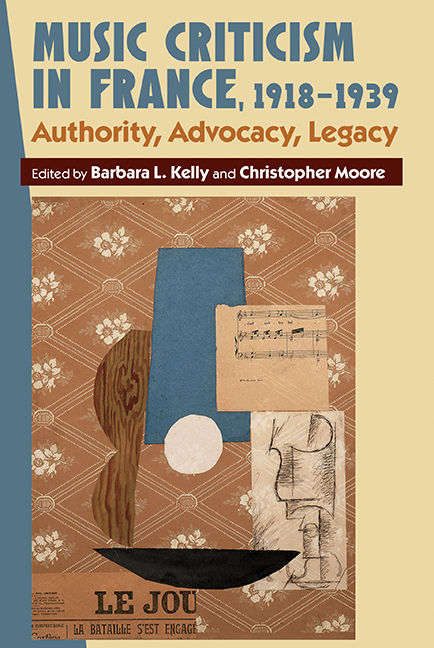Book contents
- Frontmatter
- Contents
- List of Figures
- List of Tables
- List of Contributors
- Acknowledgements
- Introduction: The Role of Criticism in Interwar Musical Culture
- 1 Music Criticism and Aesthetics During the Interwar Period: Fewer Crimes and More Punishments
- 2 Nostalgia and Violence in the Music Criticism of L'Action française
- 3 Charles Koechlin: The Figure of the Expert
- 4 Bleu-horizon Politics and Music for Radio Listeners: L'Initiation à la musique (1935)
- 5 Common Canon, Conflicting Ideologies: Music Criticism in Performance in Interwar France
- 6 Arthur Honegger: Music Critic for Musique et Théâtre (1925–1926)
- 7 A Woman's Critical Voice: Nadia Boulanger and Le Monde musical, 1919–1923
- 8 From a Foreign Correspondent: The Parisian Chronicles of Alejo Carpentier
- 9 Debussy's ‘Reputational Entrepreneurs’: Vuillermoz, Koechlin, Laloy and Vallas
- 10 The Legacy of War: Conceptualising Wartime Musical Life in the Post-War Musical Press, 1919–1920
- 11 Satie, Relâche and the Critics: Controversies and Legacy
- 12 Creating a Canon: émile Vuillermoz's Musiques d'aujourd'hui and French Musical Modernity
- Selected Bibliography
- Index
2 - Nostalgia and Violence in the Music Criticism of L'Action française
Published online by Cambridge University Press: 17 July 2019
- Frontmatter
- Contents
- List of Figures
- List of Tables
- List of Contributors
- Acknowledgements
- Introduction: The Role of Criticism in Interwar Musical Culture
- 1 Music Criticism and Aesthetics During the Interwar Period: Fewer Crimes and More Punishments
- 2 Nostalgia and Violence in the Music Criticism of L'Action française
- 3 Charles Koechlin: The Figure of the Expert
- 4 Bleu-horizon Politics and Music for Radio Listeners: L'Initiation à la musique (1935)
- 5 Common Canon, Conflicting Ideologies: Music Criticism in Performance in Interwar France
- 6 Arthur Honegger: Music Critic for Musique et Théâtre (1925–1926)
- 7 A Woman's Critical Voice: Nadia Boulanger and Le Monde musical, 1919–1923
- 8 From a Foreign Correspondent: The Parisian Chronicles of Alejo Carpentier
- 9 Debussy's ‘Reputational Entrepreneurs’: Vuillermoz, Koechlin, Laloy and Vallas
- 10 The Legacy of War: Conceptualising Wartime Musical Life in the Post-War Musical Press, 1919–1920
- 11 Satie, Relâche and the Critics: Controversies and Legacy
- 12 Creating a Canon: émile Vuillermoz's Musiques d'aujourd'hui and French Musical Modernity
- Selected Bibliography
- Index
Summary
The French newspaper L'Action française was the official press organ of the political league of the same name, a right-wing, ultranationalist, anti-Semitic movement founded in 1899, which gained notoriety and exercised considerable intellectual influence in the wake of the Dreyfus Affair. The movement's principal ideologue was Charles Maurras, a prolific writer and prominent political figure who maintained his position as editor-in-chief of L'Action française up until the political party's imposed dissolution at the end of the German Occupation of France in 1944. During the 1920s the political influence of Action française waned considerably. Condemned by the Pope in 1926, its political ambitions were severely curtailed as a result of diminished support from its traditional political base of Catholic sympathisers. Its fortunes changed dramatically, however, in the wake of the anti-democratic and violent demonstrations that took place in Paris on 6 February 1934. Primarily instigated by right-wing leagues including the Camelots du Roi, the paramilitary wing of Action française, these riots were the bloodiest civic confrontation to have occurred on French streets since the Commune. Viewed by some historians as a failed coup d’état, the February riots represented an attack on France's democratic and republican institutions and pointed to the swelling influence of militant far-right movements, including Action française, during this period. It ultimately caused the resignation of Prime Minister Édouard Daladier, the downfall of the acting leftist coalition government, and a growing radicalisation on both sides of the political spectrum.
Although a partisan political publication, by the late 1920s L'Action française began to resemble a general-interest daily newspaper with pages devoted to national and international affairs, the economy, sport and culture. This ostensible editorial mainstreaming did not however entail a concomitant whitewashing of its political agenda; indeed, Maurras and his journalists regularly called for the assassination of their political foes from the front pages of the paper, and the venture's financial fortunes were consistently troubled as a result of the legal challenges mounted against it for various cases of defamation. In 1929 a weekly instalment entitled ‘Les Spectacles’ was inaugurated and featured reviews of film, theatre and music that served to complement the publication's traditional critical focus on literature. Similarly to the newspaper's political journalists, contributors to ‘Les Spectacles’ were partisan in their political orientation.
- Type
- Chapter
- Information
- Music Criticism in France, 1918–1939Authority, Advocacy, Legacy, pp. 43 - 62Publisher: Boydell & BrewerPrint publication year: 2018

